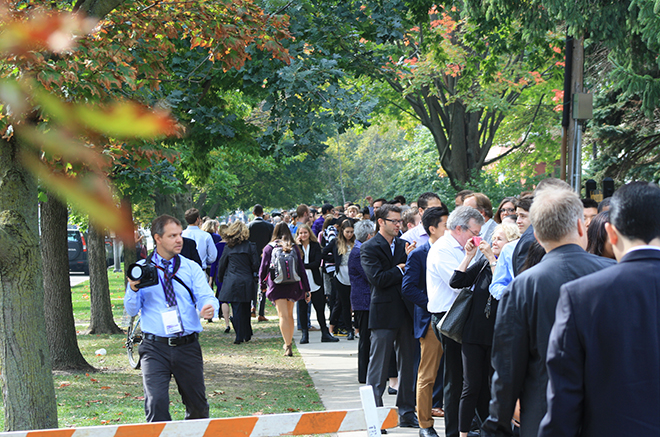
Sitting in the front row of the McTrib Forum on Thursday, I listened intently to every word of President Obama’s speech. I will admit it: he got me. He wooed me with his words and charmed me with that childish half–grin. I empathized with his frustration about partisan gridlock and the often–unfair accusations leveled at him by his critics.
His demeanor deeply impressed me – his ease in front of the camera and his complete mastery of the content. During the speech I was looking for some sort of teleprompter, some sort of script. But the president’s eyes constantly searched the crowd, making hundreds if not thousands of personal connections during his time onstage. The man either has the peripheral vision of a mayfly or the memory of an elephant, both of which are nothing short of astounding.
But after discussing the speech with other viewers, I realized something. This speech was nothing but an extended, one-man commercial. It was nothing but a stump speech by Obama for the rest of his party.
If there is one thing I can take away from the three elections I’ve been alive and aware enough to witness, it’s that the best candidate does not win. The best campaigner wins. Though George W. Bush was a notoriously poor speaker, he was famed for his relatability and personal charm, while 2004 Democratic challenger John Kerry looked aloof and unrelatable in comparison. Against Barack Obama, who proved once again on Thursday that he is one of the best public speakers around, 2008 Republican challenger John McCain looked as stiff as a post.
Successful campaigners also make a tricky national situation work to their advantage. George W. Bush rode his appeal as a strong leader of America’s armed forces and a proponent of national security in the wake of 9/11. The financial crisis of 2008 gifted Obama a huge advantage over foreign policy-centric McCain. Who was the better candidate in these races I will not presume to say. But in the end, strategy was not the single deciding factor. Sometimes success is a matter of political agility, who can best ride the trail.
Obama’s speech at Northwestern evokes memories of his skillful campaigning both six and two years ago. Speaking in Cahn Auditorium, he charmed the pants off everyone with his slick statistics and his gracious pauses. But he forgot to mention a few things, namely any failings by the Democratic Party or the Obama Administration. Sure, he tipped his hat by saying there is more work to be done. But he avoided admitting mistakes.
It would have lent an air of credibility to his message if he had conceded some issues and dilemmas of today and the past – and shortcomings beyond the economy. Benghazi was bungled. The red line for Assad’s war crimes was a pathetically empty threat. It would have been silly to expect the president to focus on such an embarrassing and frankly frightening scandal. However, pretending the security fumble did not happen at all made the speech sound that much more glitzy than substantial.
I genuinely appreciate the fact that Obama is making plans for well into the next decade and way beyond the end of his presidency. It shows selflessness and commitment. But this is politics, not a marketing campaign. Clearly Barack Obama is the leader of the Democratic Party. He is not unbiased. But he is also the leader of the free world and he has a moral duty to tell us the reality of the situation and present his government’s foresight to solve tomorrow’s problems. Naming selective truths is not telling the truth.
Speaking at the University of Chicago would have been too easy. Speaking about topics that do not put his administration in the best light would have been too hard. Speaking about the optimistic future of our economy at Northwestern was a marketing decision, not the decision of a pure–hearted public servant. All too often elected officials choose exactly as President Obama chose. He is certainly not the only politician to play the game, but having many players doesn’t make the game more noble.
I respect the man immensely. I have been impressed with many of the decisions he has made over the course of his two terms, but it is irresponsible of him to glaze over issues with a nice little bragging session. Six years into his presidency, I would say it is time to stop campaigning and start being more honest.
This was a discussion with the audience of graduate students in the Kellogg School of Management because Obama wanted to speak on the economy. Last I checked, Northwestern had a law school too, and I am sure plenty of those same bright minds the president referenced would have loved to hear his plans to solve the immigration crisis. But perhaps it is a little more difficult to speak so eloquently about the current state of our justice system.
He deliberately chose a topic about which we can feel optimistic. The question is whether Obama would have shown up to give a different speech.